If you’ve been following this column at all, you know that I enjoy teaching folks about the history of the real Middle Ages by pointing out the real issues with the reel Middle Ages.
This often leads to the misconceptions that I don’t “get” that many movies are meant to be “just fantasy” or that I hate most medieval movies. To such keen criticisms, I would reply that I totally get that fantasies aren’t meant to be historically accurate (though they clearly utilize that history and, fantasy or not, “teach” audiences about it), and oh my god I totally enjoy most medieval movies.
No. Scratch that. I adore most medieval movies — even the ones that cause me to roll my eyes at their historical inaccuracies.
When I’m asked what my favorite medieval movie is, though, my answer is always the same: A Knight’s Tale (dir. Brian Helgeland, 2001). Largely — and I’m gonna try to make this make sense, I swear — my undying love for this film is because of its perfect historical inaccuracies.
I first saw A Knight’s Tale in theaters. I was just finishing up my first Masters degree (in Medieval Studies, natch), and I went with a good medievalist friend of mine (Hi, Keith!) to check the movie out for, um, research purposes. It took us about five minutes for us to fall in love with it.
All these years later, I still love it.
Honestly, those first five minutes of the film exemplify almost everything that’s great about the movie. After a standard title-card historical synopsis that explains how jousting was a sport of the noble class in the Middle Ages, we meet three young men: William Thatcher (played by the late Heath Ledger), Roland (Mark Addy), and Wat Valhurst (Alan Tudyk). I love them all.
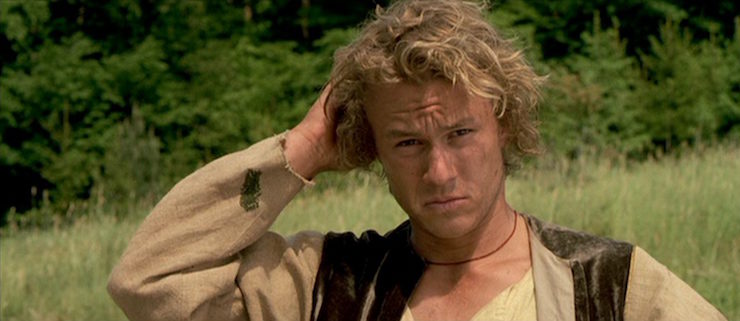
The three young fellows are squires to Sir Ector, and they’re in a bind. Sir Ector has been competing in a minor jousting tournament, and he’s been doing quite well: he only needs to ride once more through the jousting lane without being unhorsed, and he’ll be victorious. He’ll get winnings, and his squires — who haven’t eaten in three days — will get a square meal. The only problem, as the young lads have just discovered, is that Sir Ector Has ceased to be, shuffled off this mortal coil, and gone to meet his maker. He is an ex-knight.
Wat: What do you mean, dead?
Roland: The spark of his life is smothered in shite. His spirit is gone but his stench remains. Does that answer your question?
Within these few minutes, we see the personalities of all three of these squires, and they’re fantastic. Roland is the oldest, most experienced, and most sensible. When he sees that Ector is dead, his immediate response is to think about fetching a priest. Wat isn’t of the same mind. His reaction is to “rouse” the dead knight by kicking and beating him, taking out his frustrations in the most physical manner possible. And then there’s William, who is a deft middle ground of passions and practicality. Heath Ledger gives him a perfect balance of personality: he’s hungry, he’s angry, but he’s also resourceful and pragmatically idealistic. If he puts on Sir Ector’s armor, he muses, no one will know he’s not a noble. They can get the money, they can eat, and they can deal with the dead man later. It’s not like Ector is going anywhere, after all.
William: I’ve waited my whole life for this moment.
Wat: “You’ve waited your whole life for Sir Ector to shite himself to death?”
The scene now shifts to opening credits that unfold over scenes of the tournament and its crowd … all set to the tune of Queen’s “We Will Rock You.”
A lot of critics were thrown at this point: they complained that using a soundtrack of classic rock for a movie that is set in the 1370s is tremendously anachronistic.
They’re quite right. The music of Queen is about six centuries off the mark for the movie’s setting. At the same time, as the director himself rightly pointed out, a traditional symphonic score would also be pretty damn anachronistic, even if we don’t think of it that way. There were no symphonies in the fourteenth century, after all.
The anachronism is just getting started, though, and how it happens shows that there’s something important at work here: before we know what’s happening, Queen isn’t just the background soundtrack for the audience: it’s what the tournament crowd itself is singing. And they’re singing it while doing the wave, eating turkey legs, and waving banners in support of one knight or another. Not one bit of it is accurate to history, yet it’s oh so perfectly historical.
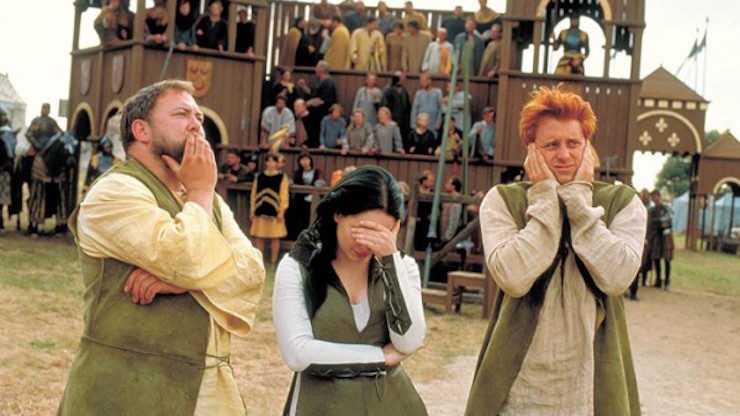
This is a complex idea, and it’ll take some unpacking. My medievalist friend with whom I watched the movie in the theater would go on to write a wonderful and oft-cited essay about the unfair standards against which academics judge medieval films. It’s a rebuke, in many ways, of the kind of naysaying that I sometimes do in this column. Along the way, Dr Kelly (Hi, Keith!) utilizes A Knight’s Tale to make his point (I told you we both loved this film):
From a post-modern perspective, this film challenges the ideas of a medieval past as being so very different from the present. Spectators singing a rock and roll song by Queen at a medieval joust certainly raise the eyebrow of many, but the song certainly strikes a more familiar chord with a modern audience than the strumming of a lute. Does the modern song convey the enthusiasm and pageantry of such events to a modern audience more successfully than an authentic tune would have done? A Geoffrey Chaucer — thin, energetic and young — who cavorts before the nobles and composes caustic and humorous rhyme, while not the Geoffrey found in the Ellesmere manuscript, certainly conveys the poet’s style (or at least a particular view of that style) in a modern sense.
In other words, there is a truth of historical reality, and then there is a truth of historical relationship — a difference between knowing the actual physical feel of the past and the relative emotional feel of it. This is not to say that anything goes and facts are no longer facts. As I’ve noted before, that’s pretty much my idea of Hell. Rather, facts have contexts, and that context drives our emotional responses to the facts.
Because we don’t live in the fourteenth century, we don’t have the same context for a historically accurate jousting as a person would have had back then. A tournament back in the day was like the Super Bowl, but a wholly accurate representation of the event would not give us that same sense. Rather than pulling us into the moment, the full truth would push us out of it: rather than fostering the connection between the present and the past, it would have emphasized the separation. So Helgeland split the difference: he included tons of historical accuracies with non-historical familiarities.
It’s brilliant and delightful fun.
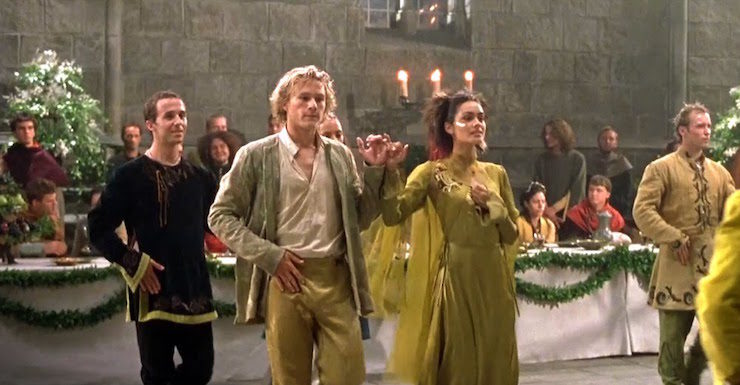
As good a job as that opening scene does in establishing this framework, though, my favorite example of how A Knight’s Tale uses these twin presentations of truth is later in the film, when William — now jousting in disguise as Sir Ulrich von Liechtenstein — goes to a dance. The dance begins by being truthful to historical reality: medieval instruments making simple sounds as the dancers go through formalized movements. It all seems quite stilted and unexciting to us now, but such a dance would have been quite the party in the fourteenth century.
So how does the film convey this? By having the musicians seamlessly slip their lute-strumming into a familiar tune that evolves into David Bowie’s “Golden Years” … at the very same time that the dancers devolve their formalized organization into the unbridled joy and chaos of a modern dance floor.
Oh hell yeah.
(If you’re interested, composer Carter Burwell has written about the difficulties of getting the music to work through this sequence.)
The filmmakers even took this same balance into their costuming and design. The hairstyles and garb of love-interest Jocelyn (Shannyn Sossamon) and her lady-in-waiting, Christiana (Berenice Bejo), are particularly fascinating in this regard.
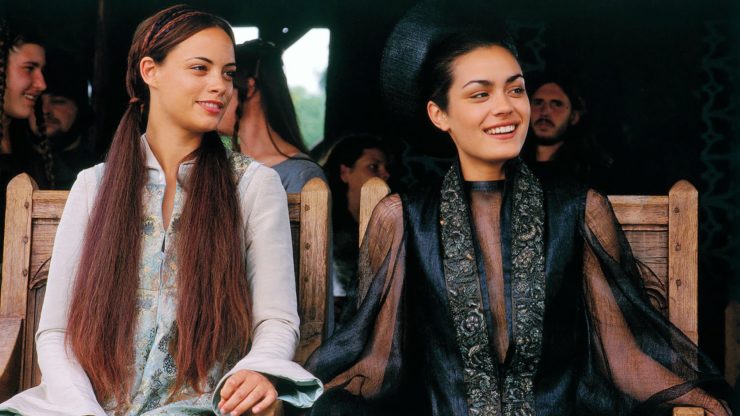
Still, I don’t want to give you the impression that Helgeland just tossed real historical truth out the window. There’s a lot of medieval truth in this film. Roland’s concern about the implications of the number 13, for instance, or the fascination with the symbology of the phoenix. Or having patents of nobility with wax seals attached to them.
Ulrich von Lichtenstein was a real knight (though dead for about 100 years by the time of the movie’s action, and he’s most well-known for writing about what it means to be a knight. The film splices the inspiration of this idea with Geoffrey Chaucer’s Canterbury Tales (thus Simon the Summoner and Peter the Pardoner) and legends of the life of William Marshall with a subplot involving the Free Companies via Adhemar, count of Anjou (Rufus Sewell) and his squire Germaine (Scott Handy).
And oh yes, Chaucer is literally a character in this film. Played by Paul Bettany, he steals scenes left and right. Hell, his first appearance in the film is his naked ass striding across the frame and on down the road, interrupting our lads in their journey:
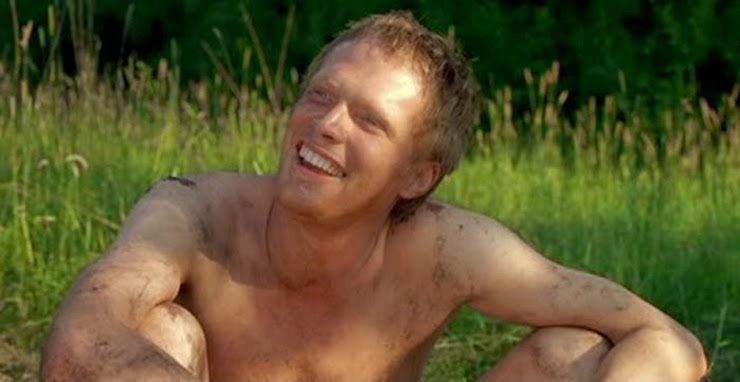
William: Oi sir, what are you doing?
Chaucer: Uh… trudging. [pause] You know, trudging? To trudge: the slow, weary, depressing yet determined walk of a man who has nothing left in life except the impulse to simply soldier on.
William: Uhhh… were you robbed?
Chaucer: [laughs] Interesting question, actually. Yes, but at the same time a huge resounding no. It’s more sort of an… involuntary vow of poverty… really.
But you know on the brighter side trudging does represent pride. Pride, resolve, and faith in the good lord almighty … please, Christ, rescue me from my current tribula —
[Steps on a thorn and uses his teeth to bite it out of his foot]
— tions.
Roland: Who are you?
Chaucer: The lilium inter spinus, the lily among thorns. Geoffrey Chaucer’s the name, writing’s the game.
[Turns away, turns back]
Chaucer: Chaucer? Geoffrey Chaucer, the writer?
Wat: A what?
Chaucer: A wha- a what? A writer. You know, I write, with ink and parchment. For a penny, I’ll scribble you anything you want. From summons, decrees, edicts, warrants, patents of nobility. I’ve even been know to jot down a poem or two, if the muse descends. You’ve probably read my book? The Book of the Duchess?
[They look at each other, shake their heads]
Chaucer: Fine. Well, it was allegorical.
Roland: Well, we won’t hold that against you, that’s for every man to decide for himself.
I’m a Chaucer fanboy, obviously, but damnit that’s funny.
Look, I don’t want to give too much away, because if you haven’t seen this film you NEED TO DO SO RIGHT NOW OH MY GOD WHY ARE YOU STILL READING THIS AND NOT WATCHING IT … but I will say this:
This movie has the best push into a flashback that I’ve ever seen. It features a medieval training montage to the tune of “Low Rider.” The acting is consistently fantastic, even from relatively “minor” characters like Kate the badass blacksmith (Laura Fraser) and Sir Thomas Colville (James Purefoy). And so many lines are so very quotable.
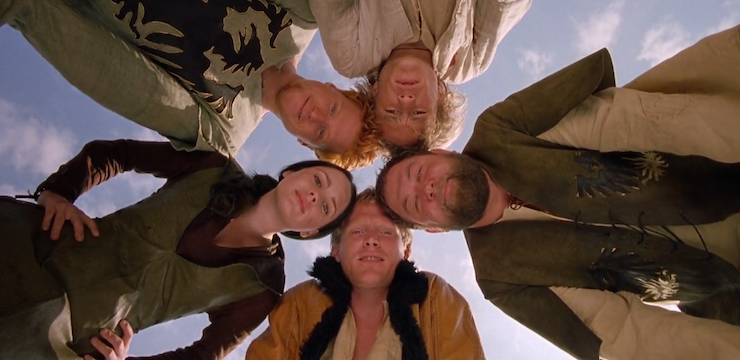
Plus, you know, slow-motion jousting with exploding lances is awesome.
Mike’s Medieval Ratings
Authenticity: 6 out of 10 Jocelyn sunbonnets
Just Plain Fun: 20 out of 10 gardens of his turbulence
Seriously, follow your feet and go check this one out. Change your stars.
 Michael Livingston is a Professor of Medieval Culture at The Citadel who has written extensively both on medieval history and on modern medievalism. His historical fantasy trilogy set in Ancient Rome, The Shards of Heaven, The Gates of Hell, and the newly released The Realms of God, is available from Tor Books.
Michael Livingston is a Professor of Medieval Culture at The Citadel who has written extensively both on medieval history and on modern medievalism. His historical fantasy trilogy set in Ancient Rome, The Shards of Heaven, The Gates of Hell, and the newly released The Realms of God, is available from Tor Books.










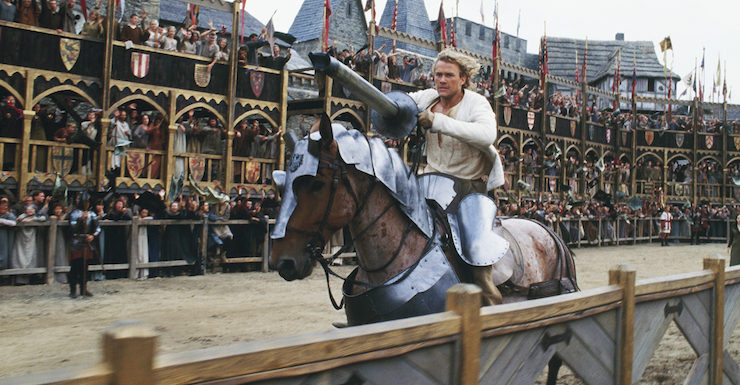
Great post! Thank you for writing this, to which I will now refer those unfortunates who “don’t get it” to when they disparage this great film. :-)
I just adore a Knight’s Tale. I fell in love with it the moment I saw a very authentic 14th c. crowd rocking to Queen. That clearly signaled that finicky period detail was not going to be a thing in this movie and that was just fine.
I get a lot of personal amusement out of William’s nom de joust as I know who Ulrich von Lichtenstein was, the jousting knight to end all jousting knight and more than a bit crazy. I also can’t help but realize that the lovely Shanny Sossamon would have been considered terribly plain in the 14th c. with her dark coloring, square jaw and wide mouth
The only part I didn’t like was the non-noble squires. Other than that, I agree, it’s wonderful! I was doing a PhD in medieval French lit at the time, and I think my friends were a little disappointed that I didn’t tear it to pieces. (My “Dan Brown is 100% wrong about the Grail” rant was a popular party trick for a while there.)
William, Roland and Wat should not have been calling themselves squires, varlets is more like it, or yeomen at best but it’s a small point and one that the general audience wouldn’t understand.
The flashback glimpse we get of Sir Ector shows he was a kind man, respectful and courteous to his social inferiors. He certainly modeled the knightly ideal well for William, which may be why he was never very successful. And when dying from dysentery he entered a tournament so his retinue could eat.
The movie is probably more acceptable because it knows it is being ridiculous, at least to a certain extent, if not to the level of a full-out parody, at least openly crossing the line to the absurd. That makes its deviations palatable, I guess, compared to a movie like First Knight and it doesn’t quite come across as grating as say Your Highness.
However, I can’t help but be sad when watching it, because it reminds me that Heath Ledger died too young.
Ah, one of my favorite movies. It drags a bit when they go to France and felt like it could have been a bit shorter, but what a cast. . .Ledger, Bettany, Alan Tudyk (Wash? Are you kidding me?), rounded out with Rufus Sewell, and James Purefoy BEFORE he was Mark Antony.
It was Ledger before EVERYONE knew, but he’d already stolen a couple movies by that point so some of us knew.
“He once spent a year in silence to better understand the sound of a whisper.”
I love and hate this movie. The acting and the story are fun and enjoyable. I just can’t suspend my disbelieve enough to get past the Rock-n-Roll music. I love both Rock-n-Roll, being of the hippie generation, and anything Middle Ages, I just can’t accept them together in the same world.
I’ve always been a stickler for detail, and I prefer that those details be “authentic.” I’ve also never enjoyed nor chosen to listen to rock music. That said, once I got past the initial shock of hearing “We Will Rock You” and seeing the wave, I commented to my son (who, knowing him, was most likely intentionally trying to shock me) that I recognized these choices as a way to capture the esssence of the experience to communicate it to a modern audience. He was, I think now, disappointed that I was not horrified rather than fascinated.
I so wanted to see this movie when it came out, but was too young to be let to the theatre on my own, so I managed to coax my father along (and my brother). They thought it was OK, but I absolutely loved it and have ever since. I cannot help but notice all these things like Jocelyn’s hair and gowns every time I watch it, but at the same time I totally agree that taking all these things in a stride and incorporating them to the narrative makes this movie work so much better than it otherwise probably would have. I can probably quote quite a lot from this film and sometimes find myself singing William’s little song about crossing the Thames. This was my first encounter with Paul Bettany and Alan Tudyk and Rufus Sewell and man, are they good! (The others, too).
@princessroxana, yes, Sir Ector seemed like a really nice man and I have always been convinced that after the tournament, they went back and gave him a proper burial.
And @LordVorless, same here. WAY too young. RIP, Heath, you are still sorely missed …
This movie is overflowing with eye candy for the ladies. It was the first time I saw James Purefoy, yummy. And Rufus Sewel, even yummier. Not that Heath Leadger or Paul Bettany were hard on the eyes either.
“Because we don’t live in the fourteenth century, we don’t have the same context for a historically accurate jousting as a person would have had back then”
This reminds me of what Douglas Hofstadter calls transculturation, the practice of replacing references when translating a text so that the L2 reader has a similar relationship to the referents as the L1 reader would.
I finally saw it earlier this fall and found it to be silly but hugely entertaining.
It’s got some great deleted scenes too –
*Spoilers if you haven’t seen it (obviously)*
https://youtu.be/N7jeWgTyYDg
https://youtu.be/S_jgDIfxvyc
@11. Anime fans are familiar with that as “localization,” the level beyond a mere dub, where onigiri become donuts and Osaka is from Texas.
@9, basically Sir Ector seems to be A Knight’s Tale’s answer to Sir Duncan the Strong’s mentor in the Dunk and Egg stories. And I am sure that once they got themse!ves something to eat they found a priest and got their master decently buried. They were probably quite fond of the old man, their seeming irreverence being due to acute hunger.
Thank you for your comments. I have followed this movie for years and adore it. I agree it is not always accurate but feel its spirit is that of what would have been. If they had our music then, they’d have played it the same way. Thank you as so many put this down. Its fun, lovely visually, and talks of bettering yourself and honour.
I absolutely love love love A Knight’s Tale and agree with pretty much everything you’ve said. Every time I sit down to watch it I have the stray thought of “how in the world were they able to even greenlight this movie and what exactly was the pitch?” because it sounds so bonkers but somehow ended up so good. People from distant history can feel so remote and unknowable, so I love how they were able to make these characters feel so real. One of Heath Ledger’s best performances, too.
15, Tall, Ser D uncan the Tall. And they both have a Black Prince in them. I know Heath Ledger would totally not have made a good Dunk, and I’m not sure who he would have been in some hypothetical Hedge Knight movie, but damn, I wish that could have been made.
We watched this tonight (first time for the kids to see it, my wife and I both love it) and I did notice that Joyceln does refer to them as varlets.
@18, oops. I wonder where that strong came from?
20, Well, he was strong. And him burying Ser Arlan of Pennytree was terribly sad. A movie with that opening? I’d have preferred that to Game of Thrones.
@16 If they had our music then, they’d have played it the same way.
I would think it would be very tough to play Rock-n-Roll music with Middle Ages musical instruments.
@22: Not that hard really, but it takes practice!
@13: Thank you so much… I’d seen the first scene, but not the second. I get why it was deleted, but I’d have loved it to stay too.
@10: (yeah, I’m doing this backwards. Tough). That goes for boys too! This film really cemented that I have a bit-of-a-thing for (read as ‘totally-gone-on’) ginger guys, and I’ve been in love with Alan Tudyk since.
@23 And now I mourn quietly for the album of Queen and Bowie covers by the Early Music Consort of London that will forever exist only in my imagination.
Yesssssssssss to everything the OP says in this! Definitely one of my favorites. It knows what it is and brings modern touchstones. It’s clearly thought out and going for it.
Now, if only I could get more people to see that in that steampunk Three Musketeers movie that came out, LOL!
@22 Give Richard Thompson’s version of “Oops, I did it again” for how it could have been done…
https://youtu.be/V4WGsMplGxU
@26 — YESSSSS!!!!
I have to say that I am soooo happy to see someone else mentioning the delight that is A Knights Tale.
Not only is it simply a lovely movie to watch it is a masterpiece of music (as mentioned above), editing, and mixing of genres into a seamless whole.
I could not agree more!
One of my all time favorite movies. The fact that it does take itself to seriously but yet maintains it’s genuineness is what makes it so great. The characters are played so well!
This movie deserved SO much more credit than it received. The way the music is weaved in and out a d the modern touches here and there that aren’t so obvious but add so much originality to this movie is absolute genius! Everytime I hear Golden Years I see that dance scene in my head from the very beginning.
That should read Doesn’t above ;)
A Knight’s Tale isn’t set in the Middle Ages. It’s set in RenFaire World. Very ahistorical, and a heck of a lot of fun, just as actual renaissance faires are.
I too am a huge fan of this movie and go back and watch it regularly. I first saw Paul Bettany in it and was absolutely blown away by his performance of Chaucer. I used to have the DVD of the film, where the deleted scenes @13 posted above included another scene of Chaucer introducing Sir Ulrich that is just as amusing as the one included in the film, but alas, I can’t find it to post it here.
The film is totally anachronistic, and for all the reasons you describe, still manages to work and be a great film.
Highly entertaining film.
I was just watching this last night
The music in this film—and the logic behind it—reminds me of one of my favourite Shakespeare theatres. Since Will S. & his contemporaries inserted popular music of the day into their plays, they use the popular music of our day to the same effect… but with acoustic instruments and Renaissance styling. If you’ve never heard an a capella mash-up of U2 & Elvis as part of “The Winter’s Tale,” you are missing out, my friends.
I’d also add Bill Bailey playing Heavy Metal in an Oud (which is stringed instrument much like a lute or balalaika, for those picturing a Dr Who alien) as an example of how modern music can be played in a medieval style…
I also love this film, especially the chutzpah it shows with some of the product placement. I can just imagine the conversation:
<reading contracts> “wait, it says here we’ve committed to showing the Nike logo on a piece of sports equipment featured prominently in shot for at least a minute. You know this is set in the Middle Ages, yes?”
”No problem, it’s about how jousting is a sport, right? We’ll just shove it on some armour.”
”but it says it must clearly be identified as the logo!”
”it’ll be fine, we’ll just lampshade in the script. The had logos back then, didn’t they?”
<flips through reference work> “yeah, they called them makers marks.”
”there you go, then!”
https://www.youtube.com/watch?v=vmuhUSmExzk
Stary Olsa does Medieval covers of rock music…
Stary Olsa gets bonus points for the Belarus accent sounding like I imagine a Medieval English accent would sound…
Great piece, Michael Livingston, about a wonderful film. I am normally not big on modern humor, but this film does it in such a gentle way. I just loved the mixing of the old and the new.
Michael, tripped across your recent essay when I Googled the movie while watching the it on BBC America this afternoon. It’s one of my favorite movies – I have it on DVD – and I adore the cast: James Purefoy and Paul Bettany especially. I find it nothing short of hysterical how many Paul Bettany’s movies I’ve seen where he is buck naked, it almost seems to be a “thing”. The rags-to-riches, championing the poorer and weaker, and loyalty between companions is what makes this movie resonate for me. Thanks to all who love this diamond in the rough, seeing beyond its anachronistic elements!
What a great review, upon rewatching the film (having seen it a dozen times as a kid) you’ve got it spot on about how the inaccurate touches really allow modern viewers to draw their own parallels with medieval life.
I am so delighted to see that others too have found this film to be a truly wonderful piece of art. The characters, one and all are just spot on, such humor, depth, lightness and heart. I loved them all, though my favorite is William’s father. Every microsecond from when William visits Cheapside to when he and his father embrace is a masterpiece. Brings me to tears every time. Though Master Thatcher is my favorite character, I loved them all. The Prince (Coleville) has the most amazing facial expression, when he withdraws from the match. Again when he frees William from the stocks. Wat and Roland, OMG, an entire series could have been made just of them. Geoffrey, such masterful acting, simply stunning. Every second of his performance is just beyond perfect. Jocelyn, strong yet humble, the look on her face when she asked William to run, such heartfelt tears. Those were definitely real. And that voice! I only discovered this film in 2018 when I saw it the very first time. Gripped with 100% attention from the first 5 seconds. In my eyes it is a masterpiece on so many levels. After consuming this film, I guess I now cannot ever date a woman who does not appreciate this films beauty. LOL! A great thank you to anyone who was involved in the making of this film.
A. I liked the movie, because it showed the older history and I like the knights part. B. I’d say shivary is dead because people now in days are more into lust instead of love or doing things out of the heart. C. If I could make a movie about a historical timw period it would be about the Vicking age because i find them interesting
Love love love this film. Yes, why aren’t you watching it right now?
There seem to be 2 versions tho, and one is not as good as the other .It’s maybe a directors cut, it’s got extra scenes, and the perfect rhythm of the film is jolted. I’m not a fan of directors cuts. There’s a reason things got cut in the first place.
The extra scenes do explain how Adhemar tracked William down, but I thought it’s not necessary, it added to his evil to not know how he did it.
It’s awesome. It’s a perfect film and it’s gotta for introducing students to the concept of a classic hero. William, like Theseus, is brave, talented, hard and fearless, but what sets a hero apart is, he knows the Gods love him, he knows he’s meant to stand out.
When King Ageus begs Theseus not to go to Crete.. .Even if you kill the Minotaur, you’ll never escape the Labyrinth…. Theseus just says, I’ll figure it out. It’ll be all right… And compare William… When Roland says, “if the nobles find out [you’re not Sir Ector ] there’ll be hell to pay” William gives that perfect big devil-may-care grin and says “then pray they don’t find out! ” and, they don’t! He’s lucky, as his soulmate Chaucer is lucky, they are chancers for whom things work out.
Yet the critics panned it , probably because it didn’t have a four hour close up of a dead knight with Polish wedding singers. It’s a completely perfect film, never a dull scene, really clever and funny and looks good.. ..Yes, why am I not watching it now?
I am so glad to have stumbled upon your review of A Knight’s Tale. I saw it at the theater with a friend and loved it and, as a mother with three young boys, could not wait for them to see it! My friends (mother’s) were concerned about the PG13 rating, but I assured them it was because Chaucer is nude, but he’s nude for a reason! And the female characters are strong. And Kate is a friend, NOT a love interest! Jocelyn is strong (don’t shhh me and spare him!) and her handmaiden quirky. Though rated PG13 they didn’t resort to unnecessary sex scenes. My friends just don’t get it and it’s not the kind of movie they think I’d like. But the main cast is excellent! Love love the chemistry. (though I find the extras somewhat distracting with a low-budget feel) Bad guy is sooo good. Good guy is sooo knightly. Jousting scenes are amazing! Some great videography. I watch it a couple times a year and still laugh. Sir William is good and you feel good after watching it. Thank you for your article.